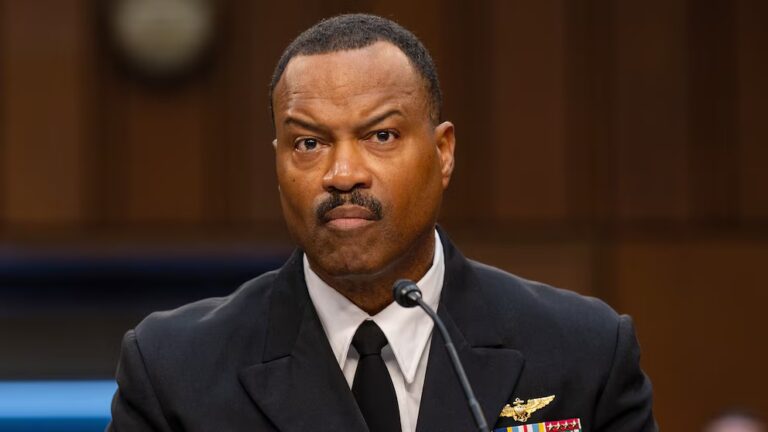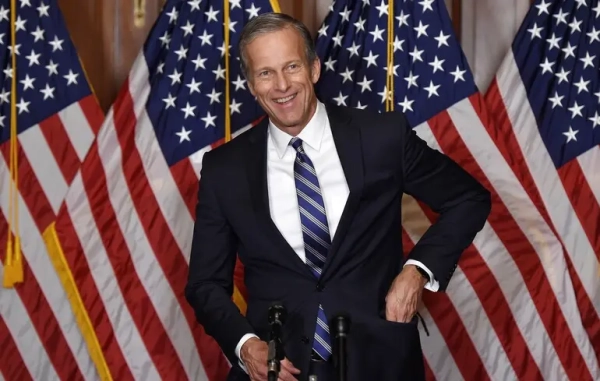
A New York Times story in April chronicled the chaos within the Trump White House as it initially responded to the coronavirus pandemic. One of the throwaway revelations in that piece was that the president’s delayed reaction to the crisis was partially due to his fears about the “deep state.”
“Mr. Trump’s response,” the authors write, “was colored by his suspicion of and disdain for what he viewed as the ‘deep state,’ the very people in his government whose expertise and long experience might have guided him more quickly toward steps that would slow the virus, and likely save lives.”
Under normal circumstances, this would be bad; in a pandemic, it’s terrifying. Now, more than ever, expertise is needed, and Trump isn’t especially interested. That a lot of his supporters think the virus itself is a deep state coup isn’t helping matters.
And Trump’s deep state obsession isn’t a new thing. He’s been pumping up this theory since special counsel Robert Mueller launched the investigation into Russia’s interference in the 2016 election. It has always been a diversion, whether it was coming from Trump or Fox News.
But here’s the thing: The deep state isn’t exactly a phantasm. There are parts of the US government that wield real power outside the conventional checks and balances of the system. It’s not a conspiracy against Trump, but the term does refer to something that exists.
David Rohde is an editor at the New Yorker and the author of In Deep: The FBI, the CIA, and the Truth About America’s “Deep State.” It’s a fair-minded look at the deep state and the various conspiracy theories surrounding it. The term “deep state,” Rohde argues, has become a way for Trump and his supporters to deflect criticism — but it’s also a real idea that can help us think through some legitimate issues, namely how we consider the limits of presidential power and the nature of government accountability.
I spoke to Rohde by phone about how the “deep state” has evolved into a sprawling conspiracy theory and if he thinks Trump’s complaints about it are at all justified. Ultimately, Rohde believes the “deep state” is both a real thing and a toxic distraction.
A lightly edited transcript of our conversation follows.
Sean Illing
What the hell is the “deep state,” David?
David Rohde
To be honest, I hate the term. I believe it’s just political rhetoric. It’s the equivalent of terms like “fake news” and “witch hunt.”
Now, on a deeper level, I do think there’s what we might call a permanent government or an institutional government. We have these incredibly large and powerful organizations like the FBI and the CIA and the NSA. In the digital age especially, when the ability to surveil is so immense, these are potentially dangerous agencies. Together these organizations make up what a lot of people mean by “deep state,” and I agree they need aggressive oversight.
Sean Illing
I get why you hate the term, but it does at least refer to something real, right?
David Rohde
That’s true. The problem is that the term has become an effective way of signaling a conspiracy for which there just isn’t any evidence.
Sean Illing
What’s the origin of this term? When did it take on the meaning it has now?
David Rohde
For decades, the term “deep state” was applied to Turkey. It was a reference to the Turkish military and their efforts to slow the spread of democracy there. Some applied it to Egypt and the Egyptian military to describe the same thing. The first time I found that the term deep state was applied to the US government was a book written in 2007 by a University of California Berkeley professor named Peter Dale Scott.
I interviewed Scott for my book, and he used the term “deep state” to describe what liberals typically fear, which is the military-industrial complex. Scott wrote about a sense that the military and defense contractors had driven the country repeatedly into wars and maybe helped fuel 9/11 and the wars that followed. For Scott, it also applied to large financial interests, like Wall Street banks.
But Scott eventually ended up doing interviews with people on the right, like conspiracy theorist Alex Jones, and the term was sort of co-opted and vulgarized into what it is today, which is a shorthand for a conspiracy against Donald Trump.
Sean Illing
Could we maybe say that, in the most generous sense possible, the term “deep state” is a way for both sides to describe parts of the government — or forces that interact with government — that aren’t elected or are beyond the conventional checks and balances of our system?
David Rohde
I think that’s fair. But I also think it’s extraordinarily effective political messaging that Trump uses to discredit rivals or people who question him.
His use of it has evolved, too. First, it was a reference to the FBI’s Russia investigation, and then it was extended to the CIA as well. But more recently he declared the Pentagon part of the deep state when some Pentagon officials questioned his defense of a Navy SEAL accused of war crimes. And now, some of Trump’s supporters are absurdly declaring [head of the National Institute of Allergy and Infectious Diseases] Dr. Fauci part of the deep state as well.
Sean Illing
Trump’s election was a shock event for a lot of people, especially for people who worked in government and were accustomed to a certain level of continuity. Did their self-conception or their understanding of their own role shift once Trump took office? What do they think they’re doing?
David Rohde
Most current officials I’ve talked to say they’re trying to do their jobs and keep their heads down and they don’t want to be part of the political brawl. And a lot of them think they’ve been hurt by the outspokenness of people like former FBI Director James Comey and others like him. They think that damages them and makes their job harder.
Sean Illing
How so?
David Rohde
They think it feeds the conspiracy theories Trump and his supporters are spinning up every day. And, to be fair, a lot of them know there was already a lot of distrust of their work after the Ed Snowden leaks [in 2013, Snowden leaked thousands of classified documents about NSA spying programs], and so that’s a cloud hovering over everything. Trump, in his own way, has exploited that lack of trust.
One of the reasons I wrote the book was a 2018 poll that found that more than 70 percent of Americans think that there is a group of unelected officials who secretly influence policy in Washington. Something like 80 percent believe they are being surveilled by the government, and the groups that had the highest belief in this or had the highest fear of this were on the right side of the spectrum.
Sean Illing
Is there a case for a more robust deep state, especially when the power of the American presidency keeps growing? Is it necessarily bad to have an alternative check on the executive?
David Rohde
I don’t think that civil servants should be resisting lawful policies being carried out by elected officials. If a civil servant doesn’t want to work for the Trump administration, they should just quit. A core ideal of our democracy is that there is a mandate that comes with elections every two, four, or six years. That mandate has to mean something. If we start playing this game of allowing unelected officials to intervene when they think it’s necessary, that’s dangerous and unpredictable.
Every president has expressed frustration with Washington when they came into office. Reagan complained about the State Department not wanting to fight communism as aggressively as he did. Barack Obama feared that Pentagon officials were leaking possible numbers for a troop increase in Afghanistan as a way to box him in and force him to send more troops than he wanted to Afghanistan. It’s the way it’s always been.
So I think if it’s a lawful policy or order, civil servants should carry it out.
Sean Illing
There’s obviously a sense in which Trump uses the term “deep state” as a diversion, a way of dismissing legitimate criticisms of himself and his administration. But does he in any way have a point when he complains about the deep state trying to undermine the White House? And I mean beyond the typical stuff you just cited.
David Rohde
Trump’s strongest case is about the FBI’s Russia investigation, and the fact that the Justice Department inspector general found that low-level FBI officials changed documents that were part of their application to surveil Carter Page. That’s bad. There’s a huge problem with the FISA process, and I accept the finding of the inspector general that the first two warrants for Carter Page to be surveilled were legal, while the subsequent two were not.
Sean Illing
That’s bad, no doubt, but it’s not an attempted “coup,” as the president claimed.
David Rohde
Absolutely not. Trump Tower was not wiretapped. Carter Page was a former Trump campaign adviser at that point. And just anecdotally, if the FBI wanted to sink his election chances, the FBI and Justice Department would have leaked during the campaign in 2016 that they were investigating him, but they didn’t do that.
Sean Illing
Bill Barr, Trump’s attorney general, gave a speech to the Federalist Society last year celebrating the power of the executive branch. He never mentions the deep state, but it’s pretty clear Barr believes it’s real and a problem —
David Rohde
Well, yes —
Sean Illing
Or am I going too far?
David Rohde
The attorney general believes that the deep state in the form of the FBI investigation of Donald Trump was hugely problematic. I believe he called it “one of the greatest travesties in American history.” I obviously disagree with that. Again, it was wrong that Carter Page was surveilled for longer than he should have been, but the Mueller investigation was carried out properly. Mueller essentially exonerated Trump of collusion.
But to add a little context to that Barr speech: He believes the legislative and judicial branches have created more power for themselves since the ’70s than they should have. He thinks the balance of power is off and his reading of the Constitution is that the executive branch should be able to use the FBI to defend the country as needed, and it’s the only branch that can act decisively in a crisis and we need a powerful president to sort of preserve the country.
Sean Illing
It’s hard to read your book right now without thinking about the coronavirus pandemic. How do you think Trump’s perception of the deep state impacted his response to the virus?
David Rohde
I spoke to a person who left the administration recently who felt that Trump’s suspicion of government officials was one of several factors that slowed the response to the coronavirus. They also felt that Trump’s belief in business, that businesses could outperform government agencies, was a big factor.
More broadly, I think all of this has shown how important basic facts are. There was an Axios poll that came out this week that showed that over 60 percent of Americans don’t think that death totals from coronavirus are accurate. Democrats think the death totals are actually higher than is being publicly reported. Republicans believe the death totals are lower. And if we can’t agree on a basic fact about how many people are dying of coronavirus, how are we going to come up with policies to help each other through this?
We’re in this cycle of distrust and disdain and conspiracy theories, and it’s dangerous, and obviously Trump’s public doubting of his own government isn’t helping.
Support Vox’s explanatory journalism
Every day at Vox, we aim to answer your most important questions and provide you, and our audience around the world, with information that has the power to save lives. Our mission has never been more vital than it is in this moment: to empower you through understanding. Vox’s work is reaching more people than ever, but our distinctive brand of explanatory journalism takes resources — particularly during a pandemic and an economic downturn. Your financial contribution will not constitute a donation, but it will enable our staff to continue to offer free articles, videos, and podcasts at the quality and volume that this moment requires. Please consider making a contribution to Vox today.
Sourse: vox.com






